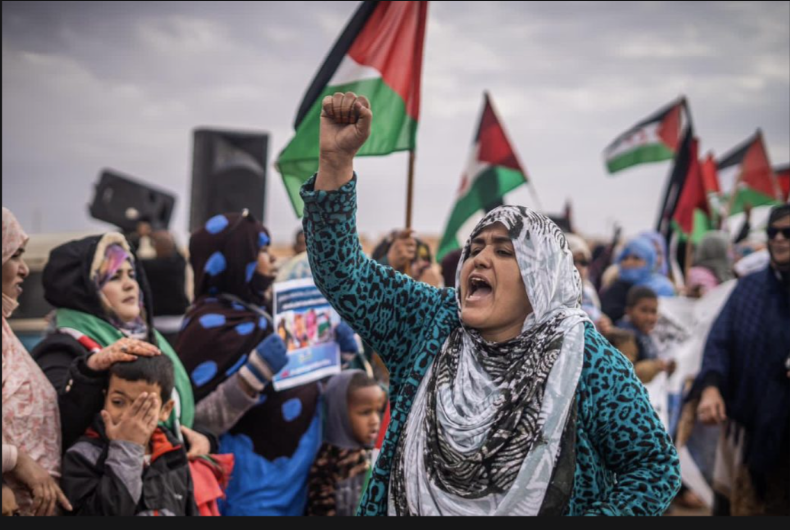 In the vast desert of Western Sahara, an enduring struggle for self-determination continues largely unnoticed by the world. For nearly five decades, the Sahrawi people have been fighting to reclaim their homeland, occupied by Morocco since 1975, in what has become one of the world’s longest unresolved conflicts. Yet despite international resolutions and calls for action, the Sahrawi liberation movement remains underfunded, underreported, and under-supported. Now more than ever, a global campaign is needed to reignite awareness and drive real action for the Sahrawi people’s freedom.
In the vast desert of Western Sahara, an enduring struggle for self-determination continues largely unnoticed by the world. For nearly five decades, the Sahrawi people have been fighting to reclaim their homeland, occupied by Morocco since 1975, in what has become one of the world’s longest unresolved conflicts. Yet despite international resolutions and calls for action, the Sahrawi liberation movement remains underfunded, underreported, and under-supported. Now more than ever, a global campaign is needed to reignite awareness and drive real action for the Sahrawi people’s freedom.
The story of Western Sahara is one of colonialism, occupation, and an enduring fight for liberation. Once a Spanish colony, the region was promised independence in the early 1970s, but Spain’s withdrawal from Western Sahara in 1975 set off a geopolitical scramble for control. Morocco, to the north, laid claim to the territory, while the Sahrawi people—represented by the Polisario Front, the Sahrawi national liberation movement—declared the Sahrawi Arab Democratic Republic (SADR) and sought their right to self-determination.
Morocco’s military swiftly occupied the region, resulting in a brutal conflict with the Polisario Front. Thousands of Sahrawis fled their homes, finding refuge in the harsh deserts of Algeria, where they have lived in refugee camps for decades. Despite a ceasefire brokered by the United Nations in 1991 and promises of a referendum on independence, Morocco has refused to allow the vote to take place, insisting on its sovereignty over the region.
As the decades have passed, Western Sahara’s fight for freedom has been marginalized by the international community, despite multiple UN resolutions supporting Sahrawi self-determination. Today, the Sahrawi people remain trapped in a state of limbo—some live under Moroccan occupation, where they face widespread human rights abuses, while others remain in refugee camps, waiting for a solution that seems farther away than ever.
For those Sahrawis who remain in the occupied territory, life is marked by repression and hardship. Human rights organizations, including Amnesty International and Human Rights Watch, have documented widespread abuses by Moroccan authorities, including arbitrary arrests, torture, and suppression of peaceful protests. The Sahrawis who speak out for independence or even display their flag are often met with violence, imprisonment, or worse.
Sultana Khaya, a prominent Sahrawi activist, is one of many who have faced brutal treatment for advocating for her people’s rights. She has been under house arrest for years, repeatedly assaulted by Moroccan security forces for daring to demand independence. Khaya’s story is emblematic of the wider crackdown on Sahrawi activists, who are systematically silenced in occupied Western Sahara.
Morocco’s exploitation of Western Sahara’s rich natural resources, including phosphates and fisheries, compounds the injustice. Despite international legal rulings stating that the Sahrawi people have the right to benefit from their resources, Morocco continues to profit from their land while the Sahrawis remain impoverished and disenfranchised.
In the Tindouf region of Algeria, more than 170,000 Sahrawi refugees live in harsh conditions, with limited access to basic resources such as food, water, and healthcare. For many, this has been their reality for nearly five decades. Entire generations of Sahrawis have grown up in refugee camps, their dreams of returning home fading with time.
International aid to the camps has dwindled in recent years, leaving the Sahrawi people even more vulnerable. Malnutrition, unemployment, and poor healthcare plague the camps, yet the world remains largely indifferent to their plight. The lack of political will from the global community has left the Sahrawi people trapped in a cycle of poverty and despair, with little hope of resolution.
Despite these hardships, the Sahrawi people remain resilient. The Polisario Front continues to advocate for independence, and the refugee camps serve as a hub of cultural preservation, with schools teaching the history and language of the Sahrawi people. But without significant international pressure, their dream of liberation seems increasingly elusive.
The global community has largely failed the Sahrawi people. While the United Nations established the United Nations Mission for the Referendum in Western Sahara (MINURSO) in 1991, its mandate remains limited. Unlike other UN peacekeeping missions, MINURSO has no human rights monitoring component, leaving Morocco’s abuses largely unchecked. Furthermore, the referendum promised to the Sahrawi people has been continually postponed, with Morocco refusing to allow a vote on independence.
Despite multiple UN resolutions affirming the Sahrawi people’s right to self-determination, there has been little action to enforce these rulings. Many powerful nations, including France and the United States, have been reluctant to challenge Morocco, a key ally in the region. This political inertia has allowed the status quo to persist, with the Sahrawi people suffering in silence.
 Recent developments in the geopolitical landscape have only worsened the situation. In 2020, the Trump administration controversially recognized Morocco’s claim to Western Sahara in exchange for Morocco normalizing relations with Israel. This move was widely condemned by international legal experts and the Sahrawi people, who saw it as a betrayal of their long-standing struggle for independence. The recognition by the U.S. emboldened Morocco and weakened international efforts to resolve the conflict peacefully.
Recent developments in the geopolitical landscape have only worsened the situation. In 2020, the Trump administration controversially recognized Morocco’s claim to Western Sahara in exchange for Morocco normalizing relations with Israel. This move was widely condemned by international legal experts and the Sahrawi people, who saw it as a betrayal of their long-standing struggle for independence. The recognition by the U.S. emboldened Morocco and weakened international efforts to resolve the conflict peacefully.
It is clear that the Sahrawi people cannot achieve their freedom alone. They need a global movement to support their struggle for independence, much like the international campaigns that helped end apartheid in South Africa or colonial rule in East Timor. Grassroots activism, political pressure, and global awareness are essential to put the Sahrawi cause back on the world stage.
Civil society organizations, human rights groups, and advocates for justice must rally behind the Sahrawi people and demand an end to the occupation. Social media campaigns, public protests, and diplomatic efforts can help amplify the voices of the Sahrawi people and put pressure on governments to act. The international community must call for a referendum on self-determination, ensure human rights monitoring in Western Sahara, and demand that Morocco ceases its exploitation of Sahrawi resources.
Moreover, nations across Africa, Latin America, and the Middle East must rekindle their solidarity with the Sahrawi cause, as many did in the past. Western Sahara’s struggle is not just about borders; it is about justice, human rights, and the right of all peoples to live freely in their own land.
The Sahrawi people have waited too long for justice. Their struggle for freedom and self-determination is one of the last remnants of colonialism in Africa, and the world cannot continue to ignore it. A global campaign in support of the Sahrawi liberation movement is urgently needed to put an end to the occupation, protect human rights, and bring hope to a people who have suffered for far too long.
As Nelson Mandela once said, “We know too well that our freedom is incomplete without the freedom of the Palestinian people.” The same must be said of the Sahrawi people. Their fight for independence is a fight for justice, and it is one the world can no longer afford to ignore.
Ennywealth


